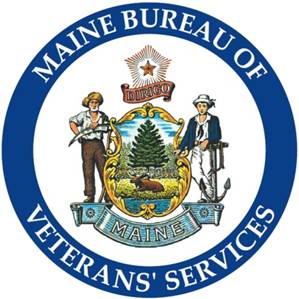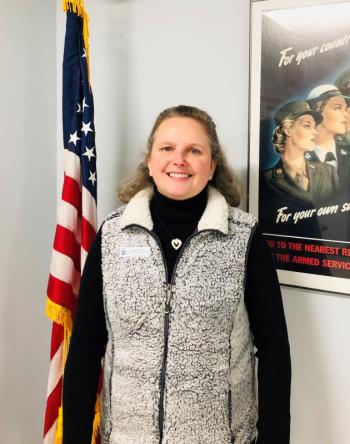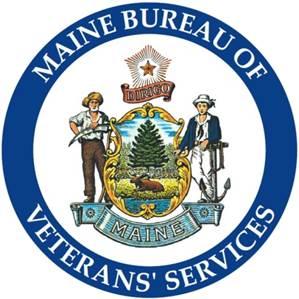Creative arts: Healing tools for veterans
Sarah Sherman is well-known for her commitment to preserving the experiences of veterans. She wrote “Southport: The War Years, An Island Remembers” in 1996, “Heroes Among Us: A History of Boothbay Region's Veterans During the Second World War” in 1999 and “Looking Back: A History of Boothbay Region’s Veterans during the Korean and Vietnam Wars,” Volumes I and II, in 2016.
Sherman was hired in 2018 as director of strategic partnerships for the Maine Bureau of Veterans’ Services and, for the last two years, she has worked with Kennebec County Sheriff and Marine Corps veteran Ken Mason and Programs Director Jess Quinn and later Programs Director Valerie Grant to facilitate a weekly, one-hour writing group for veterans incarcerated at Kennebec County Jail. Sherman also credited her affiliations with the Maine Bureau of Veterans’ Services, and acting as the Bureau’s liaison to Veterans’ Treatment Court in Kennebec County, with helping build this group and others that followed.
The initial idea for the writing group was to interact with the veterans and help them write their own stories in their own words. When the class ended, the men were asking Sherman what they were going to do next. With Mason’s support, she created a Greek mythology unit tied to the symbolism found in military emblems. The unit wrapped up with the veterans creating Greek vases out of black and orange construction paper. One of the vases was a real standout. After going through the appropriate channels, Sherman got the piece to Maine Arts Commission Visual Arts Director Julie Horn, who accepted it into the annual Art in the Capitol show. Sherman photographed the veteran’s framed artwork, printed it off at the office and brought it to the next class. When she told the class the news, the men all stood up and applauded. “They are all very supportive of each other,” she said.
The group also read 10-12 of Shakespeare’s plays that Sherman printed off along with character lists for everyone. Each veteran chose three to five of the characters from each play to read aloud. The six veterans really got into reading the plays; some even started doing sound effects and made props, and they took on both male and female roles, which was traditional in Shakespeare’s time. At one point, Sherman told the men she didn’t always want to be the girl characters.
While the group was reading “Macbeth,” one veteran went all out: At the jail library, he found a photo of the Globe Theater. He created paper images of it and of all the characters to add action to the play’s reading. The class enjoyed “Macbeth” so much, they read it twice and used handmade paper props the second time.
The Veterans’ Writing Group read some of the works of J.R.R. Tolkien and C. S. Lewis – both World War I veterans; did a unit on Maine writers, read and wrote Haiku poetry, drafted short essays, created a play about the veterans’ pod - and entered The PEN Annual Prison Writing Contest.
They worked hard on the stories, poetry and a play; they rewrote and honed them some more. One of the veterans’ stories depicted his real-life experience of the last time his father was proud of him – when he pitched and his team won a Little League baseball championship. Sherman said, “I had the veteran read his essay out aloud to the class and there wasn’t a dry eye in the house.”
They did not win the contest, but Sherman said it was exciting building up to entering. “The veterans took great pride in their work. Guys who hadn’t liked school were walking around with dictionaries and started talking to me about word choice and foreshadowing, which only bolstered my belief that everyone enjoys learning. It’s all in how you present it.”
Sherman said it can be emotional interacting with a group like this one. After a working trust has been forged, the veterans sometimes share memories that are hard to hear, such as their abusive experiences in childhood, trauma they experienced in the military, how they became effected by drugs, and how they cannot seem to leave the war behind them – things they have never told their families.
“Many of them did multiple tours in Vietnam, Iraq, or Afghanistan and never received diagnosis or treatment for post traumatic stress disorder, traumatic brain injury, or both,” shared Sherman. “I knew I had gained their respect when a new veteran would come into the pod and they would tell him, ‘You’ve got to talk to Sarah. She can help you.’”
In October, in collaboration with Kreg Ettenger of UMaine’s Maine Folklife Center, Maine Department of Corrections Commissioner Randall Liberty – an Army veteran and founder of the Veterans Pods at Kennebec County Jail and Maine State Prison – and Marine Corps veteran and Maine State Prison’s Veterans’ Pod caseworker Jason Palmer, Sherman offered the Jack Pine Project at the Maine State Prison – virtually.
The workshop used creative arts to let inmates tell their own pandemic stories. During the group’s initial meeting, Sherman talked about pandemics through time, how COVID-19 was changing the way we think and our everyday language; and the importance of writing style, punctuation and word choice. The first assignment was to write about how the pandemic was affecting them while incarcerated – how a cell shared by two adults becomes even smaller when movement around the facility is limited; fears and worries for their families — and the impact the pandemic has had on visitation. Many incarcerated veterans’ families and friends live too far away to travel to the prison or jail. COVID-19 put an end to in-person visits, but it also brought about video calls; now all the veterans could visit with loved ones far and near. Veterans who are parents can read a book to their children, and many inmates have been catching up with people they have not had contact with for months and even years.
Two classes in, the prison was shut down due to COVID-19, and yet the class still produced rough drafts, which Jason Palmer sent to Sherman via email for review. “One of the workshop participants who works in the program that trains service dogs for veterans but isn’t a veteran wrote about how he decided to become physically fit during the pandemic and started working out, which helped with his depression and to focus on his art. Said Sherman, “He is an excellent artist who took a negative and turned it into a positive.”
Early this year, COVID-19 disrupted the veterans’ writing group; Sherman was informed she could not access KCJ’s Veterans’ Pod to hold class until further notice, but she was determined to keep the group going. Sherman spoke with Mason about the possibility of starting a book group, something Mason and Sherman’s boss David Richmond fully supported. She chose two books by a WWI German veteran, Erich Maria Remarque, “All Quiet On the Western Front” and “The Road Back,” and created study packets. Sherman also made special arrangements with Maine State Prison and Maine Correctional Center to mail study packets to two veterans who had been transferred to fulfill their sentences, so they could continue to take part in class.
Last summer, Sherman received a letter from one of the veterans at Kennebec County Jail who wrote “ … it was great to be remembered and good to know someone was thinking of us.”
“The local veterans know how sincere I am and what an honor it is to preserve their stories but somehow that momentum has carried over into my life now. What was intended to be a writing class for incarcerated veterans really morphed into much more and it is a pleasure to work with these justice-effected veterans and help them find connection to resources in the community and perhaps a more positive path forward,” said Sherman.
Sherman is waiting to hear if she can start another book group. If she gets the go-ahead, Tim O’Brien’s collection of short stories from the Vietnam War era, “The Things They Carried” might be one of her choices.
Event Date
Address
United States




























